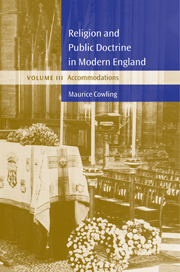Book contents
- Frontmatter
- Contents
- Foreword and acknowledgements
- Introduction
- I The Christian intellect and modern thought in modern England
- 1 The reanimation of Protestantism I
- 2 Christianity and literature I
- 3 The reanimation of Protestantism II
- 4 The enlargement of Christianity
- 5 Christianity and literature II
- 6 Christianity and modern knowledge I
- 7 Whiggism, Liberalism and Christianity I
- 8 Whiggism, Liberalism and Christianity II
- 9 Christianity and modern knowledge II
- 10 Christianity in an unfriendly world I
- 11 Christianity in an unfriendly world II
- 12 Christianity in an unfriendly world III
- 13 Christianity in an unfriendly world IV
- 14 Christianity in an unfriendly world V
- II The post-Christian consensus
- III Conclusion: religion and public doctrine in modern England
- Notes
- Index of proper names
10 - Christianity in an unfriendly world I
Published online by Cambridge University Press: 23 December 2009
- Frontmatter
- Contents
- Foreword and acknowledgements
- Introduction
- I The Christian intellect and modern thought in modern England
- 1 The reanimation of Protestantism I
- 2 Christianity and literature I
- 3 The reanimation of Protestantism II
- 4 The enlargement of Christianity
- 5 Christianity and literature II
- 6 Christianity and modern knowledge I
- 7 Whiggism, Liberalism and Christianity I
- 8 Whiggism, Liberalism and Christianity II
- 9 Christianity and modern knowledge II
- 10 Christianity in an unfriendly world I
- 11 Christianity in an unfriendly world II
- 12 Christianity in an unfriendly world III
- 13 Christianity in an unfriendly world IV
- 14 Christianity in an unfriendly world V
- II The post-Christian consensus
- III Conclusion: religion and public doctrine in modern England
- Notes
- Index of proper names
Summary
Politics and party now are not what politics and party were formerly; the struggle is between antagonist principles, and the issue is life or death to the Constitution in Church and State, under which the mercy of God has hitherto appointed us to live. I can imagine a successful resistance on our part, but I see eventual triumph for our enemies, because a mighty revolution is gradually taking place in the habits and character of thinking, among men. To oppose this is to oppose the flow of the river Amazon – steady, certain, and overwhelming. The only Conservative principle is the Protestant religion as embodied in the doctrines and framework of the Church of England.
(7th Earl of Shaftesbury, Diary, 23 January 1840, in Edwin Hodder, The Life and Work of the Seventh Earl of Shaftesbury, 1886, vol. I, p. 288)It is impossible to describe the feelings with which I stand here tonight, in the hall of my native city, and look back … upon all I owed to Birmingham in my school years … We who passed through them dimly felt that the old order was changing and that a revolution was going on about us, of which the form and the issue could not be foreseen … I seemed to discern … that all life was one, that no part lay outside my sphere, that national life, social life, civic life, were all forms of the religious life which was the embodiment of the Gospel. The fifty years which have passed since have deepened this conviction.
(Bishop B. F. Westcott, Social Service, A Speech Delivered at the Annual Meeting of the Christian Social Union, Birmingham Town Hall, November 29 1898, reprinted in Christian Social Union Addresses, 1903, pp. 46–7)- Type
- Chapter
- Information
- Religion and Public Doctrine in Modern England , pp. 247 - 291Publisher: Cambridge University PressPrint publication year: 2001

